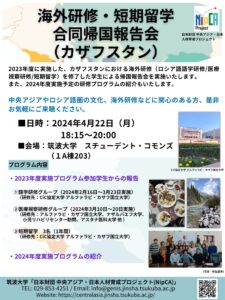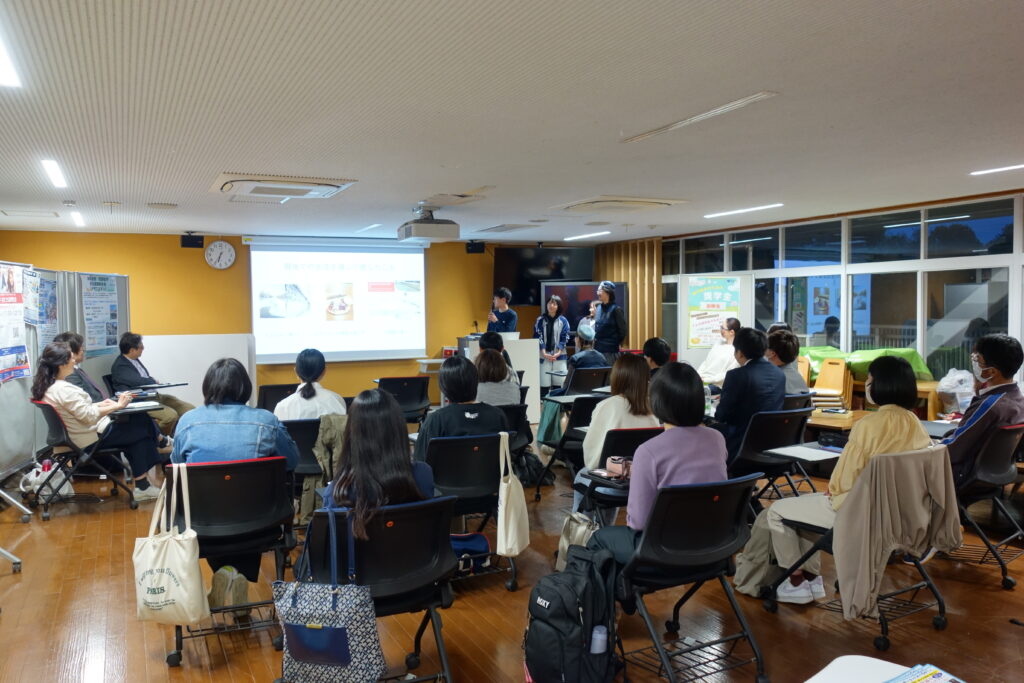 On Monday, April 22, 2024, a report-back session was held by students who participated in the following three overseas training and study abroad programs in Kazakhstan.
On Monday, April 22, 2024, a report-back session was held by students who participated in the following three overseas training and study abroad programs in Kazakhstan.
1) Short-term Russian and Kazakh language training (Kazakhstan)
(Period: February 16, 2024 ~ March 23, 2024 Destination: Al-Farabi Kazakh National University)
2) Overseas medical study tour (Kazakhstan)
(Period: March 10-20, 2024 Destination: Al-Farabi Kazakh National University, Nazarbayev University, etc.)
3) Short-term exchange program (Kazakhstan)
(Period: 10 months to 1 year Destination: Al-Farabi Kazakh National University)
1) The short-term Russian and Kazakh language training course was developed as a special free course called “Overseas Language Training Russian C” jointly by our university’s Center for Global Communication Education and our university’s Campus-in-Campus (CiC) partner institution, Al-Farabi Kazakh National University. At the return report meeting, in addition to the language study, which was the main focus of the program, the participants also reported on their daily interactions with their host families and local students, as well as the valuable experiences and new discoveries they gained through Kazakhstan’s transportation, food culture, architecture, and educational situation.
2) The overseas medical study tour is designed for undergraduate students of the medical group to visit medical universities, medical institutions, and research institutes in Almaty and Astana to deepen their understanding of the medical system, language, culture, and society, and to help them in their future career development. Participants reported that they gained insight into the differences between the two cities of Almaty and Astana, as well as their food, culture, religion and history, and also gained a deeper understanding of the local medical system and the differences between Japan and the country (such as the high proportion of young people in the population and the medical insurance system). The visit to local hospitals, research facilities, rehabilitation centers, medical schools, and nursing training schools, as well as interaction with local residents and students, provided a valuable opportunity to directly experience the state of practical medical education and medical development in Kazakhstan.
3) The purpose of short-term study abroad is to contribute to the development of multilingual human resources who can play an active role in the industrial world of Japan and Russian-speaking countries immediately after graduation. The three participants gave presentations titled “Kazakhstan, an unknown land: surprises and learnings from studying abroad,” “Harmony of different ethnic groups at the nexus of Eurasia,” and “My happy life in Kazakhstan.” There, they talked about their fulfilling year of study abroad, including efforts to adapt to daily life, social customs, and food culture; improving his Russian language skills; considering Kazakhstan’s challenges as a multi-ethnic country from a cultural geographical perspective; and, in her free time, interacting with teachers and students and learning traditional musical instruments.
This report-back session provided an opportunity for each participant to deepen their understanding of Kazakhstan’s lifestyle, culture, history, and institutions, and to realize that they have grown through new discoveries and insights as they look at the differences between Japan and Kazakhstan.




